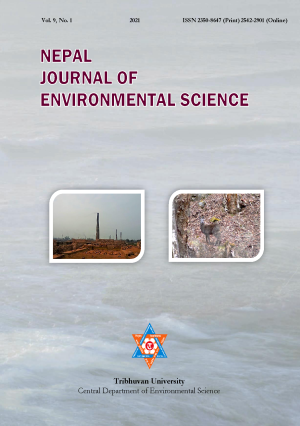Solid waste management practices and challenges in seven cities of Nepal before and during lockdown against COVID-19 pandemic
DOI:
https://doi.org/10.3126/njes.v9i1.36991Keywords:
COVID-19, emergency plans, lockdown, waste collection, waste generationAbstract
The nationwide lockdown imposed to control the spread of novel coronavirus induced dramatic alterations in different sectors of the Nepalese governance, including Solid Waste Management (SWM) practices. The study identifies SW collection gaps in seven major cities of Nepal and highlights the municipal and public households on SW management practices before and during the lockdown to emphasize the linkage between COVID-19 and SWM. It includes information on solid waste status, collection frequency and coverage, workers' safety practices, types of vehicles operated for collection and alternative methods adopted by households to manage SW during the lockdown. For this, 1329 households survey and key informant interviews were conducted in seven cities of Nepal during the lockdown. It was found that although the coverage of the collection service was similar during the pandemic in surveyed households, there was a drastic decrease in the collection frequency leading to a collection gap of around 570 tons/day. More than 50% of the surveyed households adopted no proper alternative measures as they claimed that they stored solid waste with proper management so that municipal authorities can take it. While other 50% adopted practices such as open burning, throwing in streets or composting. The study reveals poor occupational health and safety practices among solid waste workers due to the unavailability of safety gear and equipment despite being aware of the modes of transmission of the virus. The pandemic exacerbated the challenges of smooth SWM as it is an essential and needy service. This study highlights the need for a timely strategic management framework to be developed by the government to continue the smooth SWM practices during the lockdown.
Downloads
Downloads
Published
How to Cite
Issue
Section
License
This license enables reusers to distribute, remix, adapt, and build upon the material in any medium or format for noncommercial purposes only, and only so long as attribution is given to the creator.

